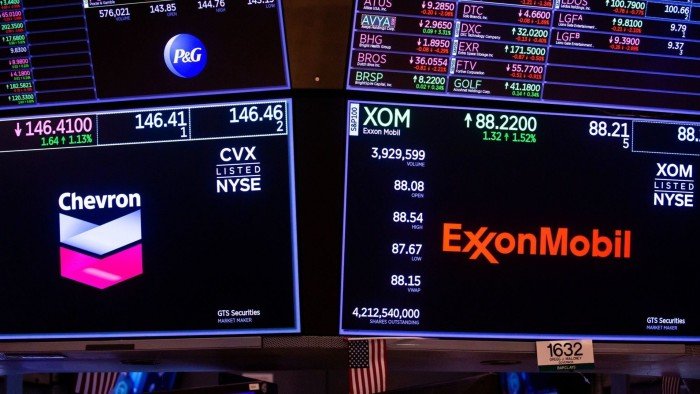Stay informed with free updates
Simply sign up to the Oil & Gas industry myFT Digest — delivered directly to your inbox.
A bitter dispute between ExxonMobil and Chevron over ownership of a gigantic oil project with up to $1tn in reserves is scheduled to be heard before an arbitration court in London on Monday, in a case with big implications for both companies and the wider industry.
The US supermajors are battling over the right to acquire a 30 per cent stake in Guyana’s Stabroek oilfield which is owned by Hess, a US energy company that agreed to a $53bn takeover by Chevron in September 2023.
Exxon, which owns 45 per cent of Stabroek, claims it has “right of first refusal” to buy Hess’s stake in the oilfield under the terms of a joint operating agreement (JOA) with Hess and another partner, Cnooc, the Chinese oil and gas company. Cnooc, with 25 per cent of the oilfield, has filed a claim seeking the same pre-emption right.
Lawyers are monitoring the International Chamber of Commerce arbitration to determine whether future JOAs will need to be updated to reflect the outcome of Exxon’s case, which involves pre-emptive rights — contractual provisions giving a party the right to buy an asset before it is offered to others.
Stabroek is one of the most lucrative oil discoveries in recent decades with an estimated 11bn barrels of oil reserves and further exploration likely to increase this figure. The project has transformed Exxon’s fortunes, enabling it to reclaim its position as the most valuable US oil company after briefly being eclipsed by Chevron in October 2020.
Over the next 15 years Exxon and its partners are forecast to generate $182bn in profits from oil and gas sales from the Guyana oilfields, according to Wood Mackenzie, an energy consultancy. Guyana’s government should receive more than $190bn, a vast sum for a country that was one of the poorest in South America until Exxon struck oil in 2015.
“Guyana is one of the most prized oil and gas projects on the planet. It was developed in record time, provides comparatively low-emissions oil at a break-even price that is below $30 a barrel, which makes it super profitable,” said Luiz Hayum, an analyst at Wood Mackenzie.
Chevron, which is not a direct participant in the arbitration case, is desperate to push ahead with its Hess acquisition to access the company’s Guyana assets. Last year Chevron’s oil and gas reserves fell to 9.8bn barrels, down from 11.1bn barrels in 2023, the lowest in more than a decade.
Mike Wirth, Chevron chief executive, has said he is confident the company will prevail over Exxon. “This has been studied extensively, and we feel like they clearly have the right side of this argument,” he told a Goldman Sachs conference in January.
In March, Chevron disclosed it had bought almost 5 per cent of Hess shares on the open market, an unusual move which analysts interpreted as a sign the company is confident the long-delayed transaction will proceed.
But Exxon chief executive Darren Woods has also talked up the company’s prospects and claimed last year it is “standing up for what we believe is a fundamental right”.
The hearing will be held in private before a three-judge panel. Sources close to the process told the Financial Times the case probably hinges on the interpretation of a few words related to pre-emptive rights in the JOA, which has not been published by any of the parties.
Lawyers for Hess are expected to argue that a right of first refusal clause contained in the JOA only applies when one of the partners seeks to sell the Guyana assets, and not in a corporate takeover. Exxon is expected to argue the clause covers Chevron’s takeover of Hess because the Guyana assets makes up about 70 per cent of the value of the entire company.
“Exxon will argue Hess is basically a huge Guyana asset and a bunch of rats and mice. In other words, everything else is pretty insignificant,” said one veteran oil executive with experience of JOAs.
David Hoffman, a professor of law at University of Pennsylvania, said the outcome could shape how future JOAs are drafted.
“Because so much money is at stake here I’m sure the relevant lawyers will understand what the dispute is about and they are going to know who wins and they are going to try and adjust their practice accordingly,” he said.
Analysts said the outcome was more important for Chevron than Exxon because of the company’s need to find growth opportunities and boost its oil reserves.
“If Mike Wirth completes Hess he is in good shape to retire and leave his era in charge as a hero. But if Chevron loses then he may need a different big deal, like Oxy [Occidental Petroleum], to cement his long legacy,” said Paul Sankey, an oil analyst.







